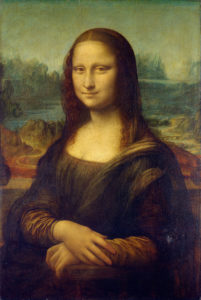
Believe it or not, some people keep trying to claim copyright ownership on a creative work that was already in the Public Domain due to copyright expiration. This is kind of like some random person trying to charge extra for admission to public land that is supposed to be free to access. That is because copyright is an exclusive right to make copies (or permit copies to be made) of a creative work. It is the creation of the work that merits the copyright, not making copies of it.
Making a copy of a Public Domain work in another format is not copyrightable. See case law in https://en.wikipedia.org/wiki/Bridgeman_Art_Library_v._Corel_Corp. and https://www.law.cornell.edu/copyright/cases/36_FSupp2d_191.htm where the court says that taking a picture of a public domain work of art does not create a copyright, even though the output is in a different format. Everything published before 1923 is firmly in the Public Domain, including everything that Leonardo da Vinci painted. If you just take a picture of it, that is just making a copy, not creating a new creative work, so the result is still in the Public Domain. If you make a copy in another file format, that is still just making a copy, and not making a new creative work, and therefore does not merit copyright.
Facts are not copyrightable. Function is not copyrightable. (It may be patentable, like the PDF patent, but Adobe granted open rights to anyone to use their PDF patent.) Mechanical or slavish replication of data or an artistic work is not copyrightable separately. Arrangement of names and phone numbers in a phone book is not creative enough to be copyrightable. See case law in https://en.wikipedia.org/wiki/Feist_Publications,_Inc.,_v._Rural_Telephone_Service_Co. and https://www.law.cornell.edu/copyright/cases/499_US_340.htm where the Supreme Court says so.
Anyway, all this means that just because you convert a work into another file format does not mean that you can copyright the result, even if it took a lot of labor or expense to do so. Labor isn’t copyrightable. Creativity is. Therefore, if a work is in the Public Domain, there is no loophole in the law that allows you to enslave it to copyright again just by making a copy in another format. You could do some creative enhancement to the work and copyright the derivative work, but the original Public Domain work stays in the Public Domain.
I like this, because it means that I can use lots of Public Domain works freely in all sorts of good ways. This is really important to me in the case of the Holy Bible. Recent translations may be copyrighted, but the original manuscripts and older translations are all in the Public Domain. And they stay there. I believe that is a good thing!